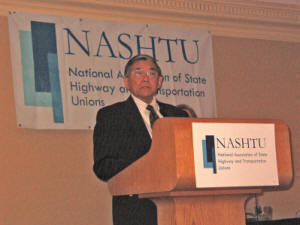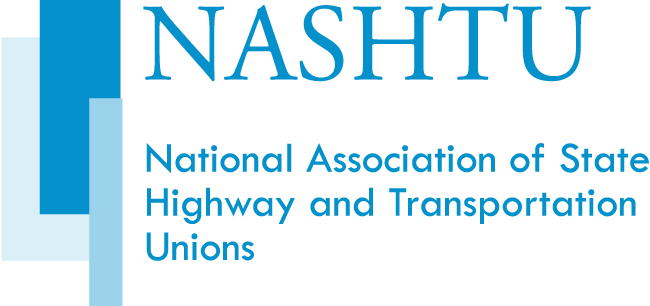2002 Conference Speakers
2002 Speaker U.S. Senator Jim Jeffords
Remarks by the Honorable Norman Y. Mineta
Secretary of Transportation
May 3, 2002
 Good afternoon. Thank you Mary (Richards) for the warm and welcoming introduction. It is a pleasure to join the members of the National Association of State Highway and Transportation Unions (NASHTU) for your 3rd Annual Conference.
Good afternoon. Thank you Mary (Richards) for the warm and welcoming introduction. It is a pleasure to join the members of the National Association of State Highway and Transportation Unions (NASHTU) for your 3rd Annual Conference.
Representing more than 26 unions and associations, the 100,000 members of NASHTU help to keep our nation moving forward. And the American people are proud and honored to have you on our transportation team.
Our nation’s highways, roadways and bridges, are the backbone of the U.S. economy – we should never forget that the work we do, assuring the mobility and safety of all Americans is very, very important.
I know that safety – particularly work zone safety – is a priority for your organization. Let me say that safety is the number one transportation priority for President Bush and for the Department.
We are committed to raising the bar on safety – especially saving lives and reducing crashes in work zones.
If we want to see a substantial reduction in the number of lives lost and injuries suffered – we must rethink each project decision that leads to a work zone.
To adequately address these safety issues the Federal Highway Administration is thinking beyond the traditional approaches to work zones – more than just orange barrels, cones and barricades.
FHWA’s Work Zone safety initiatives include designing defensive work zones to protect workers; identifying and promoting work zone best practices; planning and designing projects so workers get in, get out, and stay out.
Mobility and safety can and must go hand in hand. When roadwork is safely completed, with fewer delays – we all benefit. Now let me speak to another of your key transportation concerns – project accountability.
Your work as a union to address the accountability of taxpayer dollars spent on vital transportation projects is commendable.
President Bush is committed to ensuring that the resources entrusted to the Federal government are well managed and wisely used.
Know that Deputy Secretary Jackson, FHWA Administrator, Mary Peters, and I, and our colleagues at the Department of Transportation, stand with the President, and with you, in that effort.
Accountability is at the core of everything we do at DOT. You will hear me say this time and time again. We owe that to the customers we serve – the American people.
We must be ever vigilant in our oversight and inspection efforts. When any program experiences a significant increase in funding as the Federal-aid program did in 1998 under TEA-21 – up 40 percent nationally – risk increases. We must increase our oversight.
There are more opportunities and more temptation for people to cheat the system. They will also be cheating your membership out of jobs. For every billion dollars invested in transportation infrastructure, more than 42,000 jobs are created. If funds are inappropriately taken off the table, the number of jobs will be reduced.
Lawmakers are aware of the danger. That is why TEA-21 instructs the DOT Inspector General to place a greater emphasis on fraud detection, and he has.
Working with the Inspector General and with our state partners, we are increasing our awareness of fraud activities in the highway program.
We are putting the final touches on a new training course that the Office of the Inspector General will showcase at our National Fraud Conference on May 16th. I hope you plan to join us.
As states and local agencies expand the use of consultant services and implement new contracting procedures, we need to continually review the risks and revise our project management procedures to manage these risks.
As public employees, we need to be sure all of our employees understand what their responsibilities are and that they conduct their duties with the highest ethical standards. Last June, the FHWA issued a revised Stewardship and Oversight policy.
The policy makes clear that the FHWA has stewardship and oversight responsibilities on all federally funded highway programs, including construction.
It also highlights the need for FHWA to conduct program oversight and to manage oversight responsibilities for identified mega projects, where total costs are $1 billion or higher and have high public and Congressional interest .
FHWA is also committed to conducting risk assessments with States to identify strengths and weaknesses in order to prioritize oversight activities. We will trust, but we must verify.
We have also taken a ONEDOT approach – working with the Federal Transit Administration and other DOT offices – to conduct oversight on jointly funded major projects and to share effective management practices.
Clearly, we have a mandate from the American people, and from you – to improve and strengthen oversight and accountability of public funds entrusted to the Department of Transportation.
We have a responsibility to accurately and completely estimate, and disclose, costs at the onset of all projects, as well as to monitor progress and expenditures during the life of those projects.
We have had our share of success – the huge Alameda Corridor project in my home state for instance. I am proud to say that we came in on time, and on budget.
The success of the Alameda Corridor Project demonstrates what we can accomplish with innovative financing and partnerships, and it exemplifies the kind of creativity we will need in answering America’s transportation challenges in the future.
We must stay on course – as we did with the Alameda Corridor project – to keep up the inspection and oversight.
We must improve coordination between state and federal partners in order to better serve the American people. I firmly believe that efforts like yours will help us get there.
The federal government must rely on its partners at both the state and local levels who let the contracts. We must be the guardians at the gate to eliminate the potential for fraud.
If the American people pay for a ten-sack concrete job – and only get a seven-sack job, then we are not doing our jobs.
Quality control within the federal highway contracting system must be paramount to ensure that the American people don’t get short-changed on their transportation infrastructure and their hard-earned dollars.
In Rome, the Appian Way, built in 312 B.C., is still being used today. We should be building Appian Highways here in America. While some of our roads are getting a longer-than-expected life span, we can and must do a better job.
Congressman Blatnik, the father of federal oversight for transportation spending, said it best, “…the taxpayers, in the final analysis are paying the entire bill.” We have a fiduciary responsibility to the American people to give them the best quality service that their tax dollars can purchase.
Before I close, let me speak to another priority for this Administration – and for NASHTU as well – the pressing need to develop, recruit, and train tomorrow’s workforce.
The facts are pretty daunting: in the next ten years, it is likely that over half of the transportation workforce will be eligible to retire. This is compounded by the fact that fewer young people are going into transportation related fields, and emerging technologies are demanding our transportation workers to have a different set of skills.
Basically, we need to work together now to ensure that we have the human capital necessary to keep transportation strong in the years to come.
To address this issue, the Department is sponsoring a National Workforce Summit, on May 13, which also happens to be the first day of National Transportation Week.
It is our hope that this summit will be a first step in bringing government, industry, labor, and academia together to address these critical workforce issues.
We look forward to working with the members of NASHTU to address these and other challenges that lay ahead.
Thank you very much. Now I am happy to take your questions.
